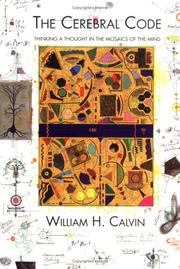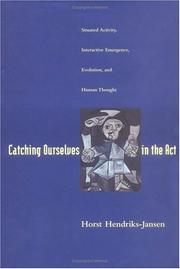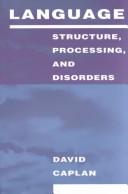| Listing 1 - 9 of 9 |
Sort by
|
Book
ISBN: 2738103561 9782738103567 Year: 1996 Volume: 25 Publisher: Paris : O. Jacob,
Abstract | Keywords | Export | Availability | Bookmark
 Loading...
Loading...Choose an application
- Reference Manager
- EndNote
- RefWorks (Direct export to RefWorks)
Perception. --- Senses and sensation. --- Thought and thinking. --- Perception --- Sens et sensations --- Pensée --- Cognition. --- Visual Perception. --- Perception, Visual --- Perceptions, Visual --- Visual Perceptions --- Vision, Ocular --- Cognitive Function --- Cognitions --- Cognitive Functions --- Function, Cognitive --- Functions, Cognitive --- Pensée
Book
ISBN: 0262278685 0585311196 9780585311197 9780262278683 Year: 1996 Publisher: Cambridge, Mass. : MIT Press,
Abstract | Keywords | Export | Availability | Bookmark
 Loading...
Loading...Choose an application
- Reference Manager
- EndNote
- RefWorks (Direct export to RefWorks)
Consciousness. --- Experience. --- Consciousness --- Experience --- Psychophysiology --- Cognition --- Mental Processes --- Psychological Phenomena and Processes --- Psychiatry and Psychology --- Awareness --- Philosophy & Religion --- Philosophy --- Mind-Body Relationship (Physiology) --- Physiologic Psychology --- Physiological Psychology --- Psychology, Physiologic --- Mind-Body Relations (Physiology) --- Psychology, Physiological --- Mind Body Relations (Physiology) --- Mind Body Relationship (Physiology) --- Mind-Body Relation (Physiology) --- Mind-Body Relationships (Physiology) --- Physiologic Psychologies --- Psychologies, Physiologic --- Relation, Mind-Body (Physiology) --- Relations, Mind-Body (Physiology) --- Relationship, Mind-Body (Physiology) --- Relationships, Mind-Body (Physiology) --- Psychosomatic Medicine --- Mind-Body Relations, Metaphysical --- Consciousnesses --- Situation Awareness --- Situational Awareness --- Awareness, Situation --- Awareness, Situational --- Awarenesses --- Awarenesses, Situation --- Awarenesses, Situational --- Situation Awarenesses --- Situational Awarenesses --- Psychologic Processes --- Psychologic Processes and Principles --- Psychological Processes --- Phenomena, Psychological --- Processes, Psychologic --- Processes, Psychological --- Psychological Phenomenas --- Psychological Processe --- Human Information Processing --- Information Processing, Human --- Cognitive Function --- Cognitions --- Cognitive Functions --- Function, Cognitive --- Functions, Cognitive --- Knowledge, Theory of --- Psychology --- Reality --- Pragmatism --- Apperception --- Mind and body --- Perception --- Spirit --- Self --- Psychological Phenomena --- Psychiatry

ISBN: 0226505251 0226505278 0226505294 0226505286 9780226505251 9780226505275 Year: 1996 Publisher: Chicago, Il. London University of Chicago Press
Abstract | Keywords | Export | Availability | Bookmark
 Loading...
Loading...Choose an application
- Reference Manager
- EndNote
- RefWorks (Direct export to RefWorks)
Environmental risk assessment --- Environmental policy --- Refuse and refuse disposal --- Public opinion --- Government policy --- #SBIB:002.IO --- #SBIB:35H434 --- #SBIB:316.334.5U43 --- #SBIB:324H74 --- Beleidssectoren: milieubeleid en ruimtelijke ordening --- Sociologie van stad en platteland: milieubewegingen --- Politieke verandering: sociale bewegingen --- Public opinion. --- Differentiation (Cognition) --- Design perception --- Pattern recognition --- Form perception --- Figure-ground perception --- Cognitive psychology --- Cognition. --- Judgment. --- Cognition --- Pattern perception --- Thought and thinking --- Mind --- Thinking --- Thoughts --- Educational psychology --- Philosophy --- Psychology --- Intellect --- Logic --- Perception --- Psycholinguistics --- Self --- Judgments --- Cognitive Function --- Cognitions --- Cognitive Functions --- Function, Cognitive --- Functions, Cognitive --- Cognitive psychology. --- United States --- Environmental risk assessment - Public opinion. --- Refuse and refuse disposal - Government policy - United States. --- Discarded materials --- Disposal of refuse --- Garbage --- Household waste --- Household wastes --- Rubbish --- Solid waste management --- Trash --- Waste disposal --- Waste management --- Wastes, Household --- Sanitation --- Factory and trade waste --- Pollution --- Pollution control industry --- Salvage (Waste, etc.) --- Street cleaning --- Waste products --- Risk assessment --- Precautionary principle --- Environmental aspects --- Judgment --- Judgement --- Judgements --- Environmental risk assessment - Public opinion --- Environmental policy - United States --- Refuse and refuse disposal - Government policy - United States

ISBN: 0585042713 9780585042718 0791429296 079142930X 0791497976 Year: 1996 Publisher: Albany, NY : State University of New York Press,
Abstract | Keywords | Export | Availability | Bookmark
 Loading...
Loading...Choose an application
- Reference Manager
- EndNote
- RefWorks (Direct export to RefWorks)
Dreams. --- Dream interpretation. --- Civilization, Modern --- Culture. --- Dreams --- Dream interpretation --- Anthropology, Cultural --- Sleep --- Sociology --- Imagination --- Anthropology --- Psychophysiology --- Social Sciences --- Cognition --- Psychological Phenomena and Processes --- Mental Processes --- Anthropology, Education, Sociology and Social Phenomena --- Psychiatry and Psychology --- Culture --- Parapsychology & Occult Sciences --- Nightmares --- Dream --- Nightmare --- Human Information Processing --- Information Processing, Human --- Psychologic Processes --- Psychologic Processes and Principles --- Psychological Processes --- Phenomena, Psychological --- Processes, Psychologic --- Processes, Psychological --- Psychological Phenomenas --- Psychological Processe --- Cognitive Function --- Cognitions --- Cognitive Functions --- Function, Cognitive --- Functions, Cognitive --- Science, Social --- Sciences, Social --- Social Science --- Mind-Body Relationship (Physiology) --- Physiologic Psychology --- Physiological Psychology --- Psychology, Physiologic --- Mind-Body Relations (Physiology) --- Psychology, Physiological --- Mind Body Relations (Physiology) --- Mind Body Relationship (Physiology) --- Mind-Body Relation (Physiology) --- Mind-Body Relationships (Physiology) --- Physiologic Psychologies --- Psychologies, Physiologic --- Relation, Mind-Body (Physiology) --- Relations, Mind-Body (Physiology) --- Relationship, Mind-Body (Physiology) --- Relationships, Mind-Body (Physiology) --- Psychosomatic Medicine --- Mind-Body Relations, Metaphysical --- Beliefs --- Cultural Background --- Cultural Relativism --- Customs --- Background, Cultural --- Backgrounds, Cultural --- Belief --- Cultural Backgrounds --- Cultural Relativisms --- Cultures --- Relativism, Cultural --- Relativisms, Cultural --- Imaginations --- General Social Development and Population --- Sleep Habits --- Sleeping Habit --- Sleeping Habits --- Habit, Sleep --- Habit, Sleeping --- Habits, Sleep --- Habits, Sleeping --- Sleep Habit --- Sleepiness --- Cultural Anthropology --- Material Culture --- Ethnography --- Culture, Material --- Ethnographies --- Material Cultures --- Qualitative Research --- Modern civilization --- Modernity --- Civilization --- Renaissance --- Analysis, Dream --- Dream analysis --- Interpretation, Dream --- Dreaming --- Subconsciousness --- Visions --- Twentieth century --- History --- Interpretation --- Psychological Phenomena --- Psychiatry

ISBN: 0262032414 0262269716 0585099146 9780585099149 9780262269711 9780262032414 9780262531542 0262531542 Year: 1996 Publisher: Cambridge, Mass. : MIT Press,
Abstract | Keywords | Export | Availability | Bookmark
 Loading...
Loading...Choose an application
- Reference Manager
- EndNote
- RefWorks (Direct export to RefWorks)
The Cerebral Code proposes a bold new theory for how Darwin's evolutionary processes could operate in the brain, improving ideas on the time scale of thought and action. Jung said that dreaming goes on continuously but you can't see it when you're awake, just as you can't see the stars in the daylight because it is too bright. Calvin's is a theory for what goes on, hidden from view by the glare of waking mental operations, that produces our peculiarly human consciousness and versatile intelligence. Shuffled memories, no better than the jumble of our nighttime dreams, can evolve subconsciously into something of quality, such as a sentence to speak aloud. The "interoffice mail" circuits of the cerebral cortex are nicely suited for this job because they're good copying machines, able to clone the firing pattern within a hundred-element hexagonal column. That pattern, Calvin says, is the "cerebral code" representing an object or idea, the cortical-level equivalent of a gene or meme. Transposed to a hundred-key piano, this pattern would be a melody - a characteristic tune for each word of your vocabulary and each face you remember. Newly cloned patterns are tacked onto a temporary mosaic, much like a choir recruiting additional singers during the "Hallelujah Chorus." But cloning may "blunder slightly" or overlap several patterns - and that variation makes us creative. Like dueling choirs, variant hexagonal mosaics compete with one another for territory in the association cortex, their successes biased by memorized environments and sensory inputs. Unlike selectionist theories of mind, Calvin's mosaics can fully implement all six essential ingredients of Darwin's evolutionary algorithm, repeatedly turning the quality crank as we figure out what to say next. Even the optional ingredients known to speed up evolution (sex, island settings, climate change) have cortical equivalents that help us think up a quick comeback during conversation. Mosaics also supply "audit trail" structures needed for universal grammar, helping you understand nested phrases such as "I think I saw him leave to go home." And, as a chapter title proclaims, mosaics are a "A Machine for Metaphor." Even analogies can compete to generate a stratum of concepts, that are inexpressible except by roundabout, inadequate means - as when we know things of which we cannot speak.
Cognitive neuroscience --- Thought and thinking --- Cerebral cortex --- Natural selection --- Mental Processes --- Central Nervous System --- Cognition --- Psychophysiology --- Biological Science Disciplines --- Learning --- Psychological Phenomena and Processes --- Nervous System --- Natural Science Disciplines --- Anatomy --- Disciplines and Occupations --- Psychiatry and Psychology --- Memory --- Thinking --- Physiology --- Consciousness --- Brain --- Human Anatomy & Physiology --- Health & Biological Sciences --- Neuroscience --- Encephalon --- Brains --- Encephalons --- Consciousnesses --- Critical Thinking --- Thinking Skills --- Thinking Skill --- Thinking, Critical --- Anatomies --- Natural Sciences --- Physical Sciences --- Discipline, Natural Science --- Disciplines, Natural Science --- Natural Science --- Natural Science Discipline --- Physical Science --- Science, Natural --- Science, Physical --- Sciences, Natural --- Sciences, Physical --- Nervous Systems --- System, Nervous --- Systems, Nervous --- Psychologic Processes and Principles --- Memory Training --- Phenomenography --- Training, Memory --- Biologic Sciences --- Biological Science --- Science, Biological --- Sciences, Biological --- Biological Sciences --- Life Sciences --- Biologic Science --- Biological Science Discipline --- Discipline, Biological Science --- Disciplines, Biological Science --- Life Science --- Science Discipline, Biological --- Science Disciplines, Biological --- Science, Biologic --- Science, Life --- Sciences, Biologic --- Sciences, Life --- Mind-Body Relationship (Physiology) --- Physiologic Psychology --- Physiological Psychology --- Psychology, Physiologic --- Mind-Body Relations (Physiology) --- Psychology, Physiological --- Mind Body Relations (Physiology) --- Mind Body Relationship (Physiology) --- Mind-Body Relation (Physiology) --- Mind-Body Relationships (Physiology) --- Physiologic Psychologies --- Psychologies, Physiologic --- Relation, Mind-Body (Physiology) --- Relations, Mind-Body (Physiology) --- Relationship, Mind-Body (Physiology) --- Relationships, Mind-Body (Physiology) --- Cognitive Function --- Cognitions --- Cognitive Functions --- Function, Cognitive --- Functions, Cognitive --- Cerebrospinal Axis --- Axi, Cerebrospinal --- Axis, Cerebrospinal --- Central Nervous Systems --- Cerebrospinal Axi --- Nervous System, Central --- Nervous Systems, Central --- System, Central Nervous --- Systems, Central Nervous --- Human Information Processing --- Information Processing, Human --- Darwinism --- Selection, Natural --- Brain mantle --- Cortex, Cerebral --- Cortex cerebri --- Mantle of brain --- Pallium (Brain) --- Mind --- Thoughts --- Cognitive neuropsychology --- Thought --- Executive Function --- Psychologic Processes --- Psychological Processes --- Phenomena, Psychological --- Processes, Psychologic --- Processes, Psychological --- Psychological Phenomenas --- Psychological Processe --- Memory Consolidation --- Education --- Psychosomatic Medicine --- Mind-Body Relations, Metaphysical --- Genetics --- Variation (Biology) --- Biological invasions --- Evolution (Biology) --- Heredity --- Telencephalon --- Educational psychology --- Philosophy --- Psychology --- Intellect --- Logic --- Perception --- Psycholinguistics --- Self --- Cognitive science --- Neuropsychology --- Cognitive neuroscience. --- Thought and thinking. --- Cerebral cortex. --- Natural selection. --- Humans --- Physiology. --- Affective and dynamic functions --- Physiology of nerves and sense organs

ISBN: 0262082489 0262519852 0262275678 0585003416 9780262275675 9780585003412 9780262519854 9780262082488 Year: 1996 Publisher: Cambridge (Mass.) : MIT press,
Abstract | Keywords | Export | Availability | Bookmark
 Loading...
Loading...Choose an application
- Reference Manager
- EndNote
- RefWorks (Direct export to RefWorks)
Connectionism --- Philosophy of mind --- Cognition --- Psychology and philosophy --- Behavioral Sciences --- Mathematical Concepts --- Pattern Recognition, Automated --- Mental Processes --- Artificial Intelligence --- Psychological Phenomena and Processes --- Computing Methodologies --- Phenomena and Processes --- Information Science --- Behavioral Disciplines and Activities --- Psychiatry and Psychology --- Neural Networks (Computer) --- Psychology --- Philosophy --- Philosophy & Religion --- Speculative Philosophy --- Philosophy and psychology --- Mind, Philosophy of --- Mind, Theory of --- Theory of mind --- Cognitive science --- Metaphysics --- Philosophical anthropology --- Connexionism --- Cognition. --- Connectionism. --- Philosophy of mind. --- Psychology and philosophy. --- Cognitive Function --- Cognitions --- Cognitive Functions --- Function, Cognitive --- Functions, Cognitive --- Factors, Psychological --- Psychological Factors --- Psychological Side Effects --- Psychologists --- Psychosocial Factors --- Side Effects, Psychological --- Factor, Psychological --- Factor, Psychosocial --- Factors, Psychosocial --- Psychological Factor --- Psychological Side Effect --- Psychologist --- Psychosocial Factor --- Side Effect, Psychological --- Connectionist Models --- Models, Neural Network --- Neural Network Models --- Perceptrons --- Connectionist Model --- Model, Connectionist --- Model, Neural Network --- Models, Connectionist --- Network Model, Neural --- Network Models, Neural --- Network, Neural (Computer) --- Networks, Neural (Computer) --- Neural Network (Computer) --- Neural Network Model --- Perceptron --- Information Sciences --- Science, Information --- Sciences, Information --- High Performance Computing --- Methodologies, Computing --- Computing Methodology --- Computing, High Performance --- Methodology, Computing --- Performance Computing, High --- Computational Intelligence --- AI (Artificial Intelligence) --- Computer Reasoning --- Computer Vision Systems --- Knowledge Acquisition (Computer) --- Knowledge Representation (Computer) --- Machine Intelligence --- Acquisition, Knowledge (Computer) --- Computer Vision System --- Intelligence, Artificial --- Intelligence, Computational --- Intelligence, Machine --- Knowledge Representations (Computer) --- Reasoning, Computer --- Representation, Knowledge (Computer) --- System, Computer Vision --- Systems, Computer Vision --- Vision System, Computer --- Vision Systems, Computer --- Human Information Processing --- Information Processing, Human --- Automated Pattern Recognition --- Pattern Recognition System --- Pattern Recognition Systems --- Concept, Mathematical --- Concepts, Mathematical --- Mathematical Concept --- Proxemics --- Behavioral Science --- Proxemic --- Science, Behavioral --- Sciences, Behavioral --- Psychologic Processes and Principles --- Heuristics --- Psychologic Processes --- Psychological Processes --- Phenomena, Psychological --- Processes, Psychologic --- Processes, Psychological --- Psychological Phenomenas --- Psychological Processe --- Computational Neural Networks --- Computational Neural Network --- Computer Neural Network --- Computer Neural Networks --- Network, Computational Neural --- Network, Computer Neural --- Networks, Computational Neural --- Networks, Computer Neural --- Neural Network, Computational --- Neural Network, Computer --- Neural Networks, Computational

ISBN: 0262082462 0262275260 0585003335 9780585003337 9780262082464 9780262275262 Year: 1996 Publisher: Cambridge, Mass. : MIT Press,
Abstract | Keywords | Export | Availability | Bookmark
 Loading...
Loading...Choose an application
- Reference Manager
- EndNote
- RefWorks (Direct export to RefWorks)
Intentionalism --- Philosophy of mind --- Philosophical anthropology --- Cognitive science --- Artificial intelligence --- Biological Processes --- Models, Theoretical --- Genetic Processes --- Behavior and Behavior Mechanisms --- Mental Processes --- Psychiatry and Psychology --- Genetic Phenomena --- Psychological Phenomena and Processes --- Investigative Techniques --- Biological Phenomena --- Phenomena and Processes --- Analytical, Diagnostic and Therapeutic Techniques and Equipment --- Behavior --- Cognition --- Biological Evolution --- Models, Psychological --- Social Sciences --- Psychology --- Model, Mental --- Model, Psychological --- Models, Mental --- Models, Psychologic --- Psychological Models --- Mental Model --- Mental Models --- Model, Psychologic --- Psychologic Model --- Psychologic Models --- Psychological Model --- Evolution, Biological --- Cognitive Function --- Cognitions --- Cognitive Functions --- Function, Cognitive --- Functions, Cognitive --- Acceptance Process --- Acceptance Processes --- Behaviors --- Process, Acceptance --- Processes, Acceptance --- Biologic Phenomena --- Biological Phenomenon --- Biological Process --- Phenomena, Biological --- Phenomena, Biologic --- Phenomenon, Biological --- Process, Biological --- Processes, Biological --- Investigative Technics --- Investigative Technic --- Investigative Technique --- Technic, Investigative --- Technics, Investigative --- Technique, Investigative --- Techniques, Investigative --- Psychologic Processes and Principles --- Genetic Concepts --- Genetic Phenomenon --- Genetic Process --- Concept, Genetic --- Concepts, Genetic --- Genetic Concept --- Phenomena, Genetic --- Phenomenon, Genetic --- Process, Genetic --- Processes, Genetic --- Human Information Processing --- Information Processing, Human --- Experimental Model --- Experimental Models --- Mathematical Model --- Model, Experimental --- Models (Theoretical) --- Models, Experimental --- Models, Theoretic --- Theoretical Study --- Mathematical Models --- Model (Theoretical) --- Model, Mathematical --- Model, Theoretical --- Models, Mathematical --- Studies, Theoretical --- Study, Theoretical --- Theoretical Model --- Theoretical Models --- Theoretical Studies --- AI (Artificial intelligence) --- Artificial thinking --- Electronic brains --- Intellectronics --- Intelligence, Artificial --- Intelligent machines --- Machine intelligence --- Thinking, Artificial --- Anthropology, Philosophical --- Man (Philosophy) --- Mind, Philosophy of --- Mind, Theory of --- Theory of mind --- Act psychology --- Action psychology --- Sociobiology --- Psychologic Processes --- Psychological Processes --- Phenomena, Psychological --- Processes, Psychologic --- Processes, Psychological --- Psychological Phenomenas --- Psychological Processe --- Molecular Biology --- Computer Simulation --- Systems Theory --- Bionics --- Digital computer simulation --- Electronic data processing --- Logic machines --- Machine theory --- Self-organizing systems --- Simulation methods --- Fifth generation computers --- Neural computers --- Science --- Civilization --- Life --- Ontology --- Humanism --- Persons --- Philosophy --- Metaphysics --- Intentionalism. --- Philosophy of mind. --- Philosophical anthropology. --- Cognitive science. --- Artificial intelligence. --- Humans --- Behaviour --- Effects of --- Mental processes

ISBN: 0262082470 0262581728 0262275414 0585003092 9780262275415 9780585003092 9780262082471 9780262581721 Year: 1996 Publisher: Cambridge London : MIT Press,
Abstract | Keywords | Export | Availability | Bookmark
 Loading...
Loading...Choose an application
- Reference Manager
- EndNote
- RefWorks (Direct export to RefWorks)
Race in the Making provides a new understanding of how people conceptualize social categories and shows why this knowledge is so readily recruited to create and maintain systems of unequal power. Hirschfeld argues that knowledge of race is not derived from observations of physical difference nor does it develop in the same way as knowledge of other social categories. Instead, his central claim is that racial thinking is the product of a special-purpose cognitive competence for understanding and representing human kinds. The book also challenges the conventional wisdom that race is purely a social construction by demonstrating that a common set of abstract principles underlies all systems of racial thinking, whatever other historical and cultural specificities may be associated with them. Starting from the commonplace observation that race is a category of both power and the mind, Race in the Making directly tackles this issue. Through a sustained exploration of continuity and change in the child's notion of race and across historical variations in the race concept, Hirschfeld shows that a singular commonsense theory about human kinds constrains the way racial thinking changes, whether in historical time or during childhood. After surveying the literature on the development of a cultural psychology of race, Hirschfeld presents original studies that examine children's (and occasionally adults') representations of race. He sketches how a jointly cultural and psychological approach to race might proceed, showing how this approach yields new insights into the emergence and elaboration of racial thinking
Cognition and culture. --- Racism. --- Ethnopsychology. --- Cognition in children. --- Child psychology. --- Prejudices in children. --- Cognition et culture --- Racisme --- Ethnopsychologie --- Cognition chez l'enfant --- Enfants --- Préjugés chez l'enfant --- Psychologie --- Cognition and culture --- Racism --- Ethnopsychology --- Cognition in children --- Child psychology --- Prejudices in children --- Culture --- Psychology, Social --- Age Groups --- Population Groups --- Thinking --- Mental Processes --- Persons --- Anthropology, Cultural --- Psychological Phenomena and Processes --- Behavior and Behavior Mechanisms --- Sociology --- Named Groups --- Social Sciences --- Anthropology --- Psychiatry and Psychology --- Anthropology, Education, Sociology and Social Phenomena --- Cross-Cultural Comparison --- Infant --- Prejudice --- Cognition --- Continental Population Groups --- Concept Formation --- Child --- Psychology --- Bias, Racial --- Race bias --- Race prejudice --- Racial bias --- Prejudices --- Anti-racism --- Race relations --- Prejudices and antipathies (Child psychology) --- Cross-cultural psychology --- Ethnic groups --- Ethnic psychology --- Folk-psychology --- Indigenous peoples --- National psychology --- Psychological anthropology --- Psychology, Cross-cultural --- Psychology, Ethnic --- Psychology, National --- Psychology, Racial --- Race psychology --- National characteristics --- Cognition (Child psychology) --- Thought and thinking in children --- Culture and cognition --- Ethnophilosophy --- Socialization --- Behavior, Child --- Child behavior --- Child study --- Children --- Pediatric psychology --- Psychology, Child --- Child development --- Developmental psychology --- Child psychiatry --- Child rearing --- Educational psychology --- Préjugés chez l'enfant --- Concept Formations --- Formation, Concept --- Formations, Concept --- Race --- Racial Stocks --- Continental Population Group --- Group, Continental Population --- Groups, Continental Population --- Population Group, Continental --- Population Groups, Continental --- Races --- Racial Stock --- Stock, Racial --- Stocks, Racial --- Cognitive Function --- Cognitions --- Cognitive Functions --- Function, Cognitive --- Functions, Cognitive --- Infants --- Transcultural Studies --- Comparison, Cross-Cultural --- Comparisons, Cross-Cultural --- Cross Cultural Comparison --- Cross-Cultural Comparisons --- Studies, Transcultural --- Study, Transcultural --- Transcultural Study --- Science, Social --- Sciences, Social --- Social Science --- General Social Development and Population --- Psychologic Processes and Principles --- Cultural Anthropology --- Ethnography --- Ethnographies --- Person --- Human Information Processing --- Information Processing, Human --- Critical Thinking --- Thinking Skills --- Thinking Skill --- Thinking, Critical --- Indigenous Population --- Native-Born --- Natives --- Tribes --- Group, Population --- Groups, Population --- Indigenous Populations --- Native Born --- Population Group --- Population, Indigenous --- Populations, Indigenous --- Age Group --- Group, Age --- Groups, Age --- Social Psychology --- Psychologies, Social --- Social Psychologies --- Beliefs --- Cultural Background --- Customs --- Background, Cultural --- Backgrounds, Cultural --- Belief --- Cultural Backgrounds --- Cultures --- Custom --- Cultural Characteristics --- Minors --- Psychologic Processes --- Psychological Processes --- Phenomena, Psychological --- Processes, Psychologic --- Processes, Psychological --- Psychological Phenomenas --- Psychological Processe --- Qualitative Research --- Thought --- Thoughts --- Race Factors --- Psychology, Perceptual --- Perceptual Psychology --- Anti-Semitism --- Islamophobia --- Anti Semitism --- Anti-Semitisms --- Islamophobias --- Material Culture --- Culture, Material --- Material Cultures --- Cultural Relativism --- Cultural Relativisms --- Relativism, Cultural --- Relativisms, Cultural --- Critical race theory --- Child Psychology

ISBN: 0262031892 0262531380 0262269848 0585353433 9780585353432 9780262269841 9780262531382 9780262031899 Year: 1996 Publisher: Cambridge, Massachustts
Abstract | Keywords | Export | Availability | Bookmark
 Loading...
Loading...Choose an application
- Reference Manager
- EndNote
- RefWorks (Direct export to RefWorks)
This theoretical guide for speech-language pathologists, neuropsychologists, neurologists, and cognitive psychologists describes the linguistic and psycholinguistic basis of aphasias that are a result of acquired neurological disease. Caplan first outlines contemporary concepts and models in language processing and then shows in detail how these are related to language disorders. Chapters are organized around basic linguistic processes such as spoken word recognition, semantics, spoken word production, reading and writing of single words, and more complex processes such as sentence production and discourse structures.Caplan's summary of the major concepts and results in both linguistics and psycholinguistics provides a solid basis for understanding current studies of language disorders as well as those likely to be discussed in the future. Considerable emphasis is placed on studies of language processing that measure what representations a subject is computing while he or she is in the middle of accomplishing a language-related task. These "on-line" studies provide the most reliable guide to the nature of many psycholinguistic processes. Throughout the book, Caplan's goal is to present material at an introductory level so that readers can become informed about the work of linguistically and psycholinguistically oriented researchers who study normal and disordered language and put this work to use in clinical practice.
Psycholinguistics --- Language disorders --- Linguistics --- Language Disorders --- Cognition --- Speech Disorders --- Communication Disorders --- Behavioral Sciences --- Mental Processes --- Psychological Phenomena and Processes --- Neurobehavioral Manifestations --- Psychiatry and Psychology --- Language --- Behavioral Disciplines and Activities --- Neurologic Manifestations --- Communication --- Nervous System Diseases --- Information Science --- Signs and Symptoms --- Pathological Conditions, Signs and Symptoms --- Diseases --- Neurology --- Medicine --- Health & Biological Sciences --- Symptoms and General Pathology --- Symptoms and Signs --- Information Sciences --- Science, Information --- Sciences, Information --- Nervous System Disorders --- Neurological Disorders --- Neurologic Disorders --- Disease, Nervous System --- Diseases, Nervous System --- Disorder, Nervous System --- Disorder, Neurologic --- Disorder, Neurological --- Disorders, Nervous System --- Disorders, Neurologic --- Disorders, Neurological --- Nervous System Disease --- Nervous System Disorder --- Neurologic Disorder --- Neurological Disorder --- Communication Programs --- Communications Personnel --- Misinformation --- Personal Communication --- Communication Program --- Communication, Personal --- Personnel, Communications --- Program, Communication --- Programs, Communication --- Focal Neurologic Deficits --- Manifestations, Neurologic --- Manifestations, Neurological --- Neurologic Dysfunction --- Neurologic Findings --- Neurologic Manifestation --- Neurologic Signs --- Neurologic Symptoms --- Neurological Manifestations --- Neurologic Deficits --- Neurologic Signs and Symptoms --- Deficit, Focal Neurologic --- Deficit, Neurologic --- Deficits, Focal Neurologic --- Deficits, Neurologic --- Dysfunction, Neurologic --- Dysfunctions, Neurologic --- Finding, Neurologic --- Findings, Neurologic --- Focal Neurologic Deficit --- Manifestation, Neurologic --- Manifestation, Neurological --- Neurologic Deficit --- Neurologic Deficit, Focal --- Neurologic Deficits, Focal --- Neurologic Dysfunctions --- Neurologic Finding --- Neurologic Sign --- Neurologic Symptom --- Neurological Manifestation --- Sign, Neurologic --- Signs, Neurologic --- Symptom, Neurologic --- Symptoms, Neurologic --- Nervous System --- Languages --- Cognitive Manifestations --- Neurobehavioral Signs and Symptoms --- Cognitive Symptoms --- Signs and Symptoms, Neurobehavioral --- Cognitive Manifestation --- Cognitive Symptom --- Manifestation, Cognitive --- Manifestation, Neurobehavioral --- Manifestations, Cognitive --- Manifestations, Neurobehavioral --- Neurobehavioral Manifestation --- Symptom, Cognitive --- Symptoms, Cognitive --- Aprosodic Speech --- Cluttering --- Dysglossia --- Dyslalia --- Rhinolalia --- Verbal Fluency Disorders --- Aprosodia --- Aprosodias --- Clutterings --- Dysglossias --- Dyslalias --- Rhinolalias --- Speech, Aprosodic --- Verbal Fluency Disorder --- Velopharyngeal Insufficiency --- Verbal Behavior --- Cognitive Function --- Cognitions --- Cognitive Functions --- Function, Cognitive --- Functions, Cognitive --- Acquired Language Disorders --- Language Disorders, Acquired --- Acquired Language Disorder --- Language Disorder --- Language Disorder, Acquired --- Verbal Learning --- Psychologic Processes --- Psychologic Processes and Principles --- Psychological Processes --- Phenomena, Psychological --- Processes, Psychologic --- Processes, Psychological --- Psychological Phenomenas --- Psychological Processe --- Human Information Processing --- Information Processing, Human --- Linguistic --- Proxemics --- Behavioral Science --- Proxemic --- Science, Behavioral --- Sciences, Behavioral --- Acquired Communication Disorders --- Childhood Communication Disorders --- Communication Disabilities --- Communication Disorders, Childhood --- Communication Disorders, Developmental --- Communication Disorders, Neurogenic --- Communicative Disorders --- Communicative Dysfunction --- Developmental Communication Disorders --- Neurogenic Communication Disorders --- Acquired Communication Disorder --- Childhood Communication Disorder --- Communication Disability --- Communication Disorder --- Communication Disorder, Acquired --- Communication Disorder, Childhood --- Communication Disorder, Developmental --- Communication Disorder, Neurogenic --- Communication Disorders, Acquired --- Communicative Disorder --- Communicative Dysfunctions --- Developmental Communication Disorder --- Disabilities, Communication --- Disability, Communication --- Dysfunction, Communicative --- Dysfunctions, Communicative --- Neurogenic Communication Disorder --- Psycholinguistic --- Language, Psychology of --- Language and languages --- Psychology of language --- Speech --- Psychology --- Thought and thinking --- Linguistic science --- Science of language --- Dysphasia --- Communicative disorders --- Psychological aspects --- Psycholinguistics. --- Language disorders. --- Linguistics. --- Cognition. --- Speech Disorders. --- Dialect --- Dialects --- NEUROSCIENCE/General --- COGNITIVE SCIENCES/Psychology/Cognitive Psychology --- LINGUISTICS & LANGUAGE/General
| Listing 1 - 9 of 9 |
Sort by
|

 Search
Search Feedback
Feedback About
About Help
Help News
News